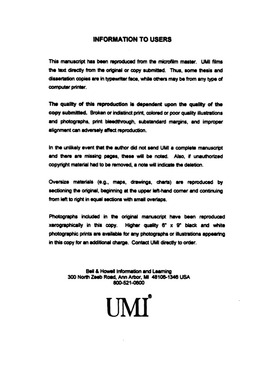| dc.contributor.advisor | Badiru, Adedeji, | en_US |
| dc.contributor.author | Bridges, Timothy Robert. | en_US |
| dc.date.accessioned | 2013-08-16T12:30:57Z | |
| dc.date.available | 2013-08-16T12:30:57Z | |
| dc.date.issued | 2000 | en_US |
| dc.identifier.uri | https://hdl.handle.net/11244/5989 | |
| dc.description.abstract | This dissertation addresses the effects of intermittent forgetting upon the learning and industrial production process. This work can apply to any process in which learning must occur and may re-occur at a later point in time following a break. Learning occurs whenever a new endeavor is accepted and continues through the life cycle of that endeavor. During the learning process and during breaks away from the learned information, forgetting occurs unless action is taken to preclude it. Through the use of simulation, this document demonstrates the effects of intermittent forgetting upon learning, productivity and overall performance using a resolution function when the time of occurrence and the duration of forgetting are predicted using a simulated queue. The resulting, simulated queues provide the times at which intermittent forgetting is initiated and the duration of forgetting. Accounting for the reduced overall rate of learning, forgetting is understood even less than learning, yet it cannot be ignored when planning the production schedule or constructing bids within a manufacturing environment. This work begins with a review of the latest findings affecting learning and forgetting, and includes the models to describe these processes. A C++ program was then run to generate the queues and compute the result upon overall learning and relearning following production breaks. The model used was multivariate using units produced and times as means to measure productivity. The model reviewed four situations: (1) No Forgetting, (2) Minimal Intermittent Forgetting, (3) High Intermittent Forgetting, (4) Continuous Forgetting. It was demonstrated that with a reasonable model to describe the learning and forgetting processes, an impact due to intermittent forgetting can be predicted and subsequently minimized. People cannot operate at peak levels continuously and it is at those times when humans are vulnerable to forgetting. Also, when not engaged within the learned activity for a period of time, the more complex aspects of the activity will be less likely to be recalled without help. This occurs in industry when production breaks occur and in all activities in which learning new information is required but will not be utilized continuously. Generally, the longer the break between the use of information, the more difficult it is to recall. This excludes those instances when during brief breaks a portion of the cognitive process may continue and actual learning, not forgetting, continues. | en_US |
| dc.description.abstract | The results of the study showed that a significant portion of resultant learning (15--20 percent) can be affected by intermittent forgetting during a cyclic production process. It is clear that the various types of learning that occur within a production environment must be analyzed independently in order to determine a means to minimize forgetting impacts. This is due to the occurrence of three types of activities occurring simultaneously: worker learning, organizational learning, and process improvement. Forgetting applies primarily to the human element, assuming that organizational learning and process improvements are documented and not lost nor difficult to retrieve. The results of this study apply in the academic world as well as the industrial world wherever forgetting is taking place which can hamper the overall learning process. | en_US |
| dc.format.extent | xi, 192 leaves : | en_US |
| dc.subject | Learning, Psychology of. | en_US |
| dc.subject | Psychology, Cognitive. | en_US |
| dc.subject | Engineering, Industrial. | en_US |
| dc.subject | Psychology, Industrial. | en_US |
| dc.subject | Education, Educational Psychology. | en_US |
| dc.subject | Learning curve (Industrial engineering) | en_US |
| dc.subject | Memory. | en_US |
| dc.title | The effect of intermittent forgetting upon learning and productivity within production systems. | en_US |
| dc.type | Thesis | en_US |
| dc.thesis.degree | Ph.D. | en_US |
| dc.thesis.degreeDiscipline | School of Industrial and Systems Engineering | en_US |
| dc.note | Source: Dissertation Abstracts International, Volume: 61-06, Section: B, page: 3225. | en_US |
| dc.note | Major Adviser: Adedeji Badiru. | en_US |
| ou.identifier | (UMI)AAI9975792 | en_US |
| ou.group | College of Engineering::School of Industrial and Systems Engineering | |
